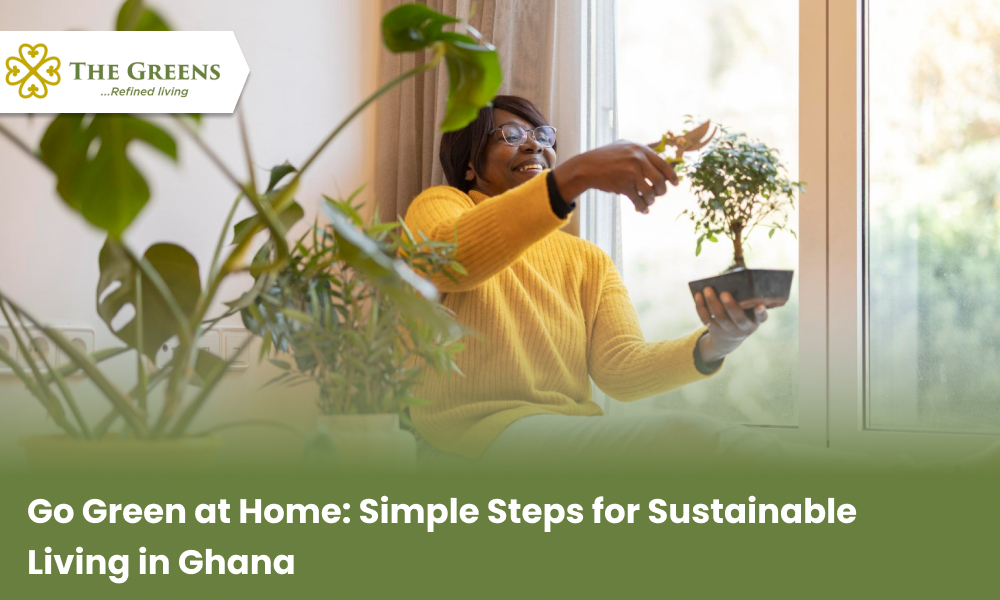Sustainable living isn’t just a trend; it’s a way to safeguard our planet for future generations, especially here in Ghana, where environmental consciousness is gaining momentum. But where do you start? Let’s dive into how you can easily incorporate sustainable practices into your daily life at home and explore success stories from those who have embraced eco-friendly living.
Start with Energy Efficiency
Energy efficiency is a cornerstone of sustainable living. In Ghana, where electricity costs can be high, making your home more energy-efficient not only helps the planet but also saves money.
Practical Tips
Switch to LED Bulbs: LED bulbs consume significantly less energy than traditional incandescent bulbs and last much longer. It’s like trading in your old car for a sleek, fuel-efficient model.
Unplug Unused Devices: Many electronics consume power even when turned off. Unplugging them when not in use reduces this “phantom” energy consumption—similar to turning off the water while brushing your teeth.
Install Solar Panels: If you have the resources, investing in solar panels can drastically cut your energy bills and reduce your reliance on the grid. Plus, with abundant sunshine in Ghana, it’s a perfect match.
Embrace Waste Reduction
Waste reduction is a critical aspect of sustainable living. In Ghana, where waste management systems are often overwhelmed, reducing the amount of waste you generate can make a big difference.
Practical Tips
Compost Organic Waste: Start composting kitchen scraps like vegetable peels and eggshells. It’s like giving your food waste a second life by turning it into nutrient-rich compost for your garden.
Reduce Packaging Waste: Shop in bulk and bring your own containers to cut down on packaging. Imagine your grocery cart filled only with essentials—no extra plastic bags in sight!
Reuse and Recycle: Repurpose old containers and recycle as much as possible. For example, glass jars can be used for storage, and old newspapers can be used for cleaning windows.
Choose Sustainable Products
Opting for sustainable products is another easy way to make your home more eco-friendly. By choosing items that are made from natural materials or produced by companies that prioritize sustainability, you can reduce your environmental impact.
Practical Tips
Buy Eco-Friendly Products: Look for items made from sustainable materials like bamboo or recycled plastics. It’s like choosing a home-cooked meal over fast food—better for you and the planet.
Bring Reusable Bags: Always carry reusable bags when shopping. They’re sturdier and more stylish than plastic ones, and they reduce the need for single-use plastics.
Support Local Artisans: Purchase locally-made products, which often have a lower carbon footprint than imported goods. Plus, you’ll be supporting the local economy.
Water Conservation Techniques
Water is essential, but it’s easy to waste, especially in regions where water shortages are common. Implementing water-saving practices in your home is a simple yet impactful way to live more sustainably.
Practical Tips
Install Low-Flow Fixtures: Consider installing low-flow showerheads and faucets to reduce water usage without sacrificing performance. It’s like savoring your favorite drink—enjoying every drop without going overboard.
Fix Leaks: A dripping faucet can waste gallons of water over time. Fixing leaks promptly is an easy way to conserve water.
Reuse Water: Catch the water that runs while you’re waiting for it to get hot and use it to water plants or clean. This simple habit can make a significant difference over time.
Grow Your Own Food
Growing your own food is one of the most rewarding aspects of sustainable living. Whether you have a large garden or just a few pots on your balcony, cultivating your own herbs, vegetables, and fruits can reduce your carbon footprint and provide fresh, organic produce for your family.
Practical Tips
Start Small: If you’re new to gardening, start with easy-to-grow herbs like basil or mint. These can thrive in small spaces and require minimal maintenance.
Use Compost: Enhance your garden’s productivity by using compost made from your kitchen waste. It’s a natural way to enrich the soil and improve plant health.
Plant Indigenous Species: Opt for local plants that are well-suited to Ghana’s climate. They typically require less water and are more resistant to local pests.
Educate Your Family
Sustainable practices are even more effective when everyone in the household is on board. By educating your family about the importance of eco-friendly living, you can create a unified approach to sustainability.
Practical Tips
Create a Family Challenge: Encourage your family to participate in a weekly challenge, such as reducing waste or cutting down on energy use. It’s like a family game—everyone gets involved, and it makes the journey exciting.
Share Knowledge: Discuss the benefits of sustainable living and share tips on how to live more eco-friendly. Celebrate successes together to keep everyone motivated.
Success Stories: Inspiring Sustainable Living in Ghana
Many Ghanaians have successfully integrated sustainable practices into their daily lives, transforming their homes into eco-friendly havens.
The Green Home in Tema: One family in Tema replaced all their old appliances with energy-efficient models, installed solar panels, and started a backyard garden. They’ve seen their energy bills drop by 50% and enjoy fresh, homegrown produce daily.
Eco-Village in Cape Coast: A community in Cape Coast has embraced sustainable living by building homes with locally-sourced materials, using rainwater harvesting systems, and growing communal gardens. This project has not only reduced the environmental impact but also strengthened community bonds.
Make Sustainability a Lifestyle
Incorporating sustainable practices at home is like planting seeds for a healthier planet. Every small effort counts. Whether it’s saving energy, reducing waste, or growing your own food, these actions accumulate and create a significant impact. So why not start today? Not only will you benefit, but you’ll also contribute to a more sustainable future for everyone. Your home can be a model of green living—let’s make it happen!


